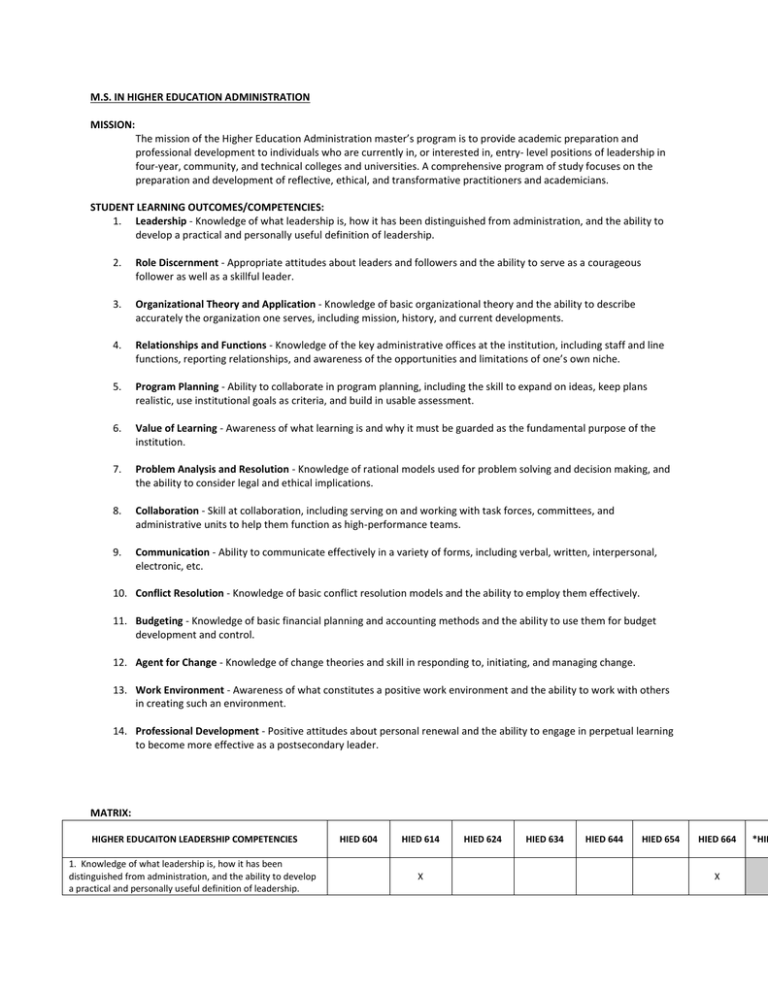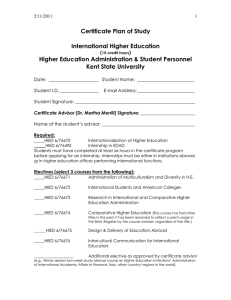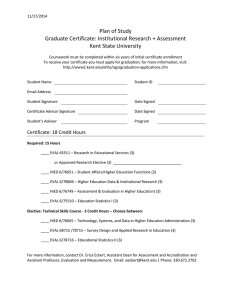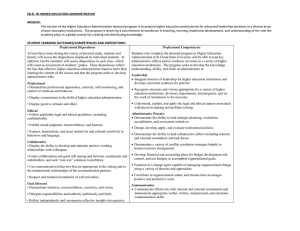M.S. IN HIGHER EDUCATION ADMINISTRATION MISSION:
advertisement

M.S. IN HIGHER EDUCATION ADMINISTRATION MISSION: The mission of the Higher Education Administration master’s program is to provide academic preparation and professional development to individuals who are currently in, or interested in, entry- level positions of leadership in four-year, community, and technical colleges and universities. A comprehensive program of study focuses on the preparation and development of reflective, ethical, and transformative practitioners and academicians. STUDENT LEARNING OUTCOMES/COMPETENCIES: 1. Leadership - Knowledge of what leadership is, how it has been distinguished from administration, and the ability to develop a practical and personally useful definition of leadership. 2. Role Discernment - Appropriate attitudes about leaders and followers and the ability to serve as a courageous follower as well as a skillful leader. 3. Organizational Theory and Application - Knowledge of basic organizational theory and the ability to describe accurately the organization one serves, including mission, history, and current developments. 4. Relationships and Functions - Knowledge of the key administrative offices at the institution, including staff and line functions, reporting relationships, and awareness of the opportunities and limitations of one’s own niche. 5. Program Planning - Ability to collaborate in program planning, including the skill to expand on ideas, keep plans realistic, use institutional goals as criteria, and build in usable assessment. 6. Value of Learning - Awareness of what learning is and why it must be guarded as the fundamental purpose of the institution. 7. Problem Analysis and Resolution - Knowledge of rational models used for problem solving and decision making, and the ability to consider legal and ethical implications. 8. Collaboration - Skill at collaboration, including serving on and working with task forces, committees, and administrative units to help them function as high-performance teams. 9. Communication - Ability to communicate effectively in a variety of forms, including verbal, written, interpersonal, electronic, etc. 10. Conflict Resolution - Knowledge of basic conflict resolution models and the ability to employ them effectively. 11. Budgeting - Knowledge of basic financial planning and accounting methods and the ability to use them for budget development and control. 12. Agent for Change - Knowledge of change theories and skill in responding to, initiating, and managing change. 13. Work Environment - Awareness of what constitutes a positive work environment and the ability to work with others in creating such an environment. 14. Professional Development - Positive attitudes about personal renewal and the ability to engage in perpetual learning to become more effective as a postsecondary leader. MATRIX: HIGHER EDUCAITON LEADERSHIP COMPETENCIES 1. Knowledge of what leadership is, how it has been distinguished from administration, and the ability to develop a practical and personally useful definition of leadership. HIED 604 HIED 614 X HIED 624 HIED 634 HIED 644 HIED 654 HIED 664 X *HIE 2. Appropriate attitudes about leaders and followers and the ability to serve as a courageous follower as well as a skillful leader. 3. Knowledge of basic organizational theory and the ability to describe accurately the organization one serves, including mission, history, and current developments. 4. Knowledge of the key administrative offices at the institution, including staff and line functions, reporting relationships, and awareness of the opportunities and limitations of one’s own niche. 5. Ability to collaborate in program planning, including the skill to expand on ideas, keep plans realistic, use institutional goals as criteria, and build in usable assessment. 6. Awareness of what learning is and why it must be guarded as the fundamental purpose of the institution. 7. Knowledge of rational models used for problem solving and decision-making, and the ability to consider legal and ethical implications. 8. Skill at collaboration, including serving on and working with task forces, committees, and administrative units to help them function as high-performance teams. 9. Ability to communicate effectively in a variety of forms, including verbal, written, interpersonal, electronic, etc. X X X X X X X X X X X X X X X X X X 10. Knowledge of basic conflict resolution models and the ability to employ them effectively. X X X X X 11. Knowledge of basic financial planning and accounting methods and the ability to use them for budget development and control. 12. Knowledge of change theories and skill in responding to, initiating, and managing change. 13. Awareness of what constitutes a positive work environment and the ability to work with others in creating such an environment. 14. Positive attitudes about research, personal renewal, and the ability to engage in perpetual learning to become more effective as a postsecondary leader. X X X X X X X X X X X * HIED 672 - Practicum in Higher Education Administration. Students are expected to provide evidence of mastery of all competencies. TIMELINE/COURSE SEQUENCE: FALL (Year One) HIED 604 (3 credits) SPRING (Year One) HIED 614 (3 credits) Introduction to Higher Education Administration Higher Education Leadership and Administration HIED 624 (3 credits) HIED 634 (3 credits) Legal and Ethical Aspects of Higher Education Human Resource Issues in Higher Education HIED 674 (3 credits) HIED 694 (3 credits) Introduction to Research in Higher Education HIED Research Methods and Design ~OR~ CEEP 678 (3 credits) Graduate Statistics FALL (Year Two) HIED 644 (3 credits) SPRING (Year Two) HIED 654 (3 credits) Higher Education Finance University – Community Relations HIED 664 (3 credits) HIED 664 (3 credits) Critical Issues Seminar in Higher Education (I) Critical Issues Seminar in Higher Education (II) HIED 684**(Plan C)/HIED 699*** (Plan A) (3 credits) HIED 684**(Plan C)/HIED 699*** (Plan A) (3 credits) Thesis/Project/Portfolio Thesis/Project/Portfolio HIED 672 (3 credits)* Practicum in Higher Education Administration *HIED 672 (3 credits) - Practicum in Higher Education Administration: Students may register for the Practicum after the majority of coursework is complete or in progress, and with the approval of their advisor. HIED 672 is offered every spring – students have one year to complete the Practicum. **HIED 684 – Plan C (3 credits) – Project/Portfolio Design: Students may register for three (3) credits either the semester of the preliminary oral exam or final defense with approval or their advisor. The preliminary exam usually takes place after completion of HIED 694. The final defense will take place at least one semester after the preliminary exam. Students choosing Plan C take two sections of HIED 664 (I and II). HIED 684 is offered every semester – students register by completing an “Individual Study Approval Form” http://www.stcloudstate.edu/graduatestudies/current/stuForms.asp ***HIED 699 – Plan A (6 credits) – Thesis: Students may register for three (3) credits during the semester of their preliminary oral exam and three (3) thesis credits during the semester of their final defense with approval of their advisor. The preliminary exam usually takes place after completion of HIED 694. The final defense will take place at least one semester after the preliminary exam. Students choosing Plan A take one section of HIED 664 (I or II). HIED 699 is offered every semester – students register by completing an “Individual Study Approval Form” http://www.stcloudstate.edu/graduatestudies/current/stuForms.asp



